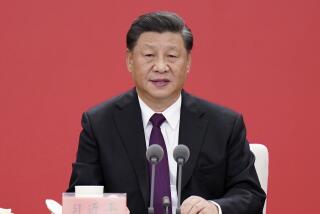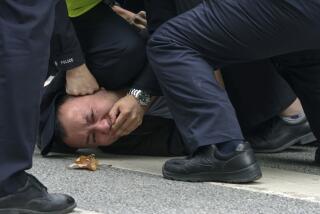Chinese Writers Leap Forward to Criticize Mao
- Share via
BEIJING — If historical debts are left unpaid, the anger of the masses will not be appeased, Mao Tse-tung declared in 1959.
Chairman Mao left a few debts of his own. And now the survivors are tallying them up--in public.
In the greatest literary outpouring of discontent in decades, Chinese writers this year have broken through a long-enforced silence, publishing dozens of books and articles criticizing Mao’s political campaigns and the terror they produced.
In their twilight years, older intellectuals are leading China’s efforts to come to grips with its traumatic modern history. Their writings are an attempt to unburden themselves of guilt and suffering and to leave a record for coming generations.
“They are really trying to salvage some human decency after all the horrible experiences they’ve been through,” says Geremie Barme, a scholar of Chinese history and literature at Australian National University in Canberra.
Although recent works by younger intellectuals advocating political reforms have drawn attention, older scholars and officials have opened up an important second front by criticizing the Communist Party’s past actions.
From the wholesale killing of landlords during the land reform of the early 1950s to the end of the decade-long Cultural Revolution in 1976, Mao’s political campaigns exacted a fearsome toll in human life. Only recently have intellectuals been able to say publicly what the campaigns did to the party’s legitimacy.
The Communists “really persecuted people so badly that their own prestige collapsed,” Wei Junyi, an 80-year-old former writer and publisher, asserts in her popular book “A Record of Thoughts on Suffering.”
The recent criticism is not only a pointed indictment but a painful confession of complicity. Wei and other writers in the genre are “loyal intelligentsia who were completely part of the Communist Party apparatus” before becoming its victims, Barme points out.
The Chinese reading public’s appetite for the new, controversial fare is enormous. Those once labeled as rightists and counterrevolutionaries have dusted off their memoirs and rushed them to press, then watched as they fill the bookshelves--and bestseller lists--of popular urban bookstores.
One of the latest volumes to come out is “Political Movements That I Have Been Through.” The book includes recollections by Mao’s personal secretary and the former vice ministers of propaganda and defense. It describes in unprecedented detail the vast penal system into which political prisoners were cast and intrigues within the military.
The books are powerful evidence of the increasing openness in Chinese society. But this does not mean that officials welcome their publication. “Every one of these works is the result of struggle,” veteran journalist Dai Huang says. “Each has been pushed and squeezed past censors.”
Dai’s recent book, “Hu Yaobang and the Overturning of Unjust Cases,” went through such a process. The bestseller documents the crucial role played by Hu, general secretary of the Communist Party from 1980 to 1987, in rehabilitating more than 450,000 people falsely accused of being rightists.
The Chinese Press and Publications Administration, whose approval is mandatory for any book about national leaders, balked at authorizing Dai’s work--even after it had been serialized in domestic newspapers and published in Hong Kong. Finally, the censors relented under pressure from Dai’s publishers, but not before several sensitive passages were expurgated.
Dai says the government “will no longer resort to terribly coercive measures to shut people’s mouths.”
Other intellectuals, however, fear that books that contradict the official version of history may vanish from the shelves when the country celebrates half a century of Communist rule next year.
But the legacy of the Mao’s reign will not be so easily laid to rest.
From the perspective of Chinese reformists, the Cultural Revolution endures not only in the scarred psyches of its victims but also in today’s politics. Writing in the popular tabloid Southern Weekend, Tsinghua University historian Qin Hui argues that the problem with Mao’s political campaigns was not their utopian idealism; it was their coercion.
“Nowadays, there is less utopianism,” Qin writes, “but not much less coercion.”
More to Read
Sign up for our Book Club newsletter
Get the latest news, events and more from the Los Angeles Times Book Club, and help us get L.A. reading and talking.
You may occasionally receive promotional content from the Los Angeles Times.








